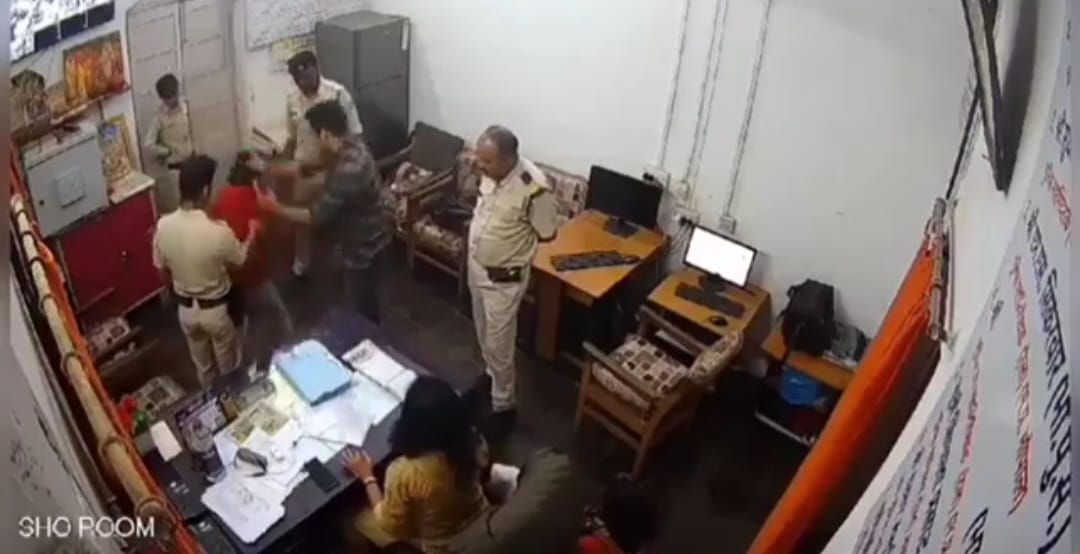By Lauren Prem
“A nation should not be judged by how it treats its highest citizens, but its lowest ones.” – Nelson Mandela
Police torture has been an issue in India since time immemorial. Legislators have always framed laws from an angle of curbing police torture. Yet, the reality presents a stark contrast, thereby, reaffirming that we are a nation paying no regard to the most vulnerable sections of our society!
The issue of police torture sparked discussions throughout our country when an old video, from October 2023, of a Dalit woman and her grandson being beaten by the railway police in Katni, Madhya Pradesh went viral on social media. Post this video going viral, the current scenario is that an investigation has been launched by the deputy superintendent of police, after the concerned police-in-charge had been removed.
The Dalit woman made a statement mentioning that she was taken behind closed doors and beaten by the police, throughout the night to extract information while her grandson was taken elsewhere to be beaten. The police claimed that the said woman and her grandson were related to a notorious criminal who absconded from a theft case and against whom 19 cases had been registered. A reward of 10,000 rupees was announced for his capture.
This gut-wrenching incident raises two crucial questions – Is the police authorized to torture someone solely because they are a repeated offender? And would this incident have happened majorly because the concerned two people are Dalits? The answer to these questions determines who we are as a society and how far we have travelled in protecting the rights of oppressed people.
In the general course of things, accused people are viewed as criminals and any torture meted out to them is often justified. However, the framers of our constitution have extensively deliberated upon the fundamental rights of the accused. An accused has a set of fundamental rights as much as anyone else. The criminal procedure code also incorporates safeguards against police torture. Yet, unfortunate incidents like these continue to happen in every nook and corner of India.
This incident serves as a relevant occasion to revisit the constitutional provisions that hold relevance. Article 20(3) of the Constitution provides the accused a right against self-incrimination. It is based on the principle that no person shall be forced to testify against himself. Meting out violence in an attempt to extract information is a gross violation of this article. Even worse, the woman and her grandson were not even the suspects or the accused in this case. Random people had been beaten up to extract information about their relative – a wanted criminal, according to the officials. In addition, the right to personal liberty enshrined under article 21 of the Constitution has also been violated.
The crucial point being made here is that the justifications given by the police is not remotely fair as per our Constitution. In other words, the actions of the police are wrong even if they had beaten up the accused himself, let alone people who are totally unrelated to the case.
The rule of law meticulously followed as a part and parcel Indian jurisprudence, entails that everyone is subservient to the laws. Police officials are no exception. Lawlessness starts at the point where someone acts superior to the law or take law into their own hands. Policemen are unauthorized to deviate from the procedure established by law and disrupt the society’s orderliness.
While victims of police torture are commonly from the poorest strata, various studies online show that Dalits are usually more prone to violence. This is the point where the issue transcends beyond a law-and-order issue to a caste issue. There is a double constitutional violation – both of which pertain to fundamental rights.
Caste is considered to be one of the biggest social evils plaguing the Indian society. Constitutional assembly debates indicate that many fundamental rights were framed by having the issue of caste at the forefront. This incident is a testament to the fact that 75 years of reservation has done less in eradication of caste.
Unequal treatment based on caste is evil. Violence based on caste is entirely on a different level – bringing back horrific memories of the pre-independence period where violence was a recurrent thing faced by the lower castes. Reservation has given us a glimmer of hope that the situation would improve by a milestone. Still, incidents like these shatters the hopes that our constitutional makers had for our nation!
“However good a Constitution may be, if those who are implementing it are not good, it will prove to be bad.” – B.R. Ambedkar


